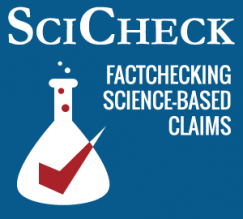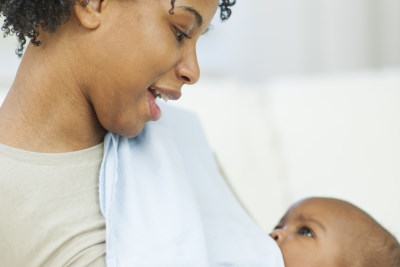No Indication Breast Milk After Vaccination Unsafe, Despite Posts About New Study
SciCheck Digest
No evidence suggests it’s dangerous for babies to consume breast milk from mothers who get vaccinated against COVID-19. Online posts, however, have pointed to a study that found temporary, trace amounts of vaccine mRNA in milk after vaccination to claim that the vaccines are unsafe.

Full Story
There is no evidence that babies are harmed by drinking breast milk from mothers who have received a COVID-19 vaccine. On the contrary, vaccinated mothers produce antibodies and even some immune cells that recognize the coronavirus, or SARS-CoV-2, in breast milk, which may provide some protection to infants.
The Centers for Disease Control and Prevention, the American College of Obstetricians and Gynecologists and the World Health Organization all recommend that lactating mothers get vaccinated, and none of them recommend withholding breast milk after vaccination.
Online posts, however, have seized on a newly published article in JAMA Pediatrics to argue that maternal vaccination is harmful to infants.
“7 out of 11 women had mRNA in their breast milk. This isn’t just a disaster for infants, it’s more proof that the mRNA/LNP in the shots hits practically every cell in the body,” one Sept. 26 Instagram post reads, sharing screenshots of the paper and quoting a tweet from Alex Berenson.
Berenson is a former New York Times reporter who has repeatedly spread misinformation about COVID-19 and the vaccines.

The study did find mRNA from the Pfizer/BioNTech or Moderna COVID-19 vaccines in breast milk samples from several women (it was actually five out of 11 women, not seven, as Berenson said, although he corrected himself on Twitter). But as we’ll explain, the amount of mRNA was exceedingly small, was detected only for up to 48 hours after vaccination, and does not mean that vaccination is hazardous to infants.
The Pfizer/BioNTech and Moderna COVID-19 vaccines contain modified messenger RNA, or mRNA, which provides the instructions for cells to briefly make some coronavirus spike proteins. This prompts the body to generate a protective immune response, so that if someone encounters SARS-CoV-2, the immune system will already be familiar with the virus and be better able to fight it off. For both vaccines, the mRNA is wrapped in fatty molecules known as lipid nanoparticles to protect and ferry the mRNA into cells, since naked mRNA is otherwise degraded too quickly.
The American College of Obstetricians and Gynecologists told us in a statement that while additional research on the safety of COVID-19 vaccination during lactation is welcome, the new findings did not change the group’s guidance that women do not need to avoid starting breastfeeding or to stop breastfeeding after vaccination.
“The findings based on a sample of breast milk in 5 women that could be measured (of the eleven) is highly speculative and does not currently represent strong evidence against breastfeeding at any point after mRNA COVID-19 vaccination,” the organization said. “Additionally, the fetal gut when consuming breast milk within the first 48 hours after a maternal vaccination would be expected to rapidly degrade any mRNA that entered it. However, even if mRNA were to be absorbed, the notion that it would be harmful to an infant is not supported by the data presented or any data currently available.”
JAMA Pediatrics Study
The JAMA Pediatrics study, which was published by researchers at NYU Long Island School of Medicine, looked for the presence of vaccine mRNA in breast milk samples collected from 11 women, between one hour and five days after vaccination with either the Pfizer/BioNTech or Moderna vaccines.
Trace amounts of vaccine mRNA were found in seven samples from five women, up to 45 hours after vaccination. For two of these women, no vaccine mRNA was detectable in whole milk, but some was identified when the researchers used a method to concentrate the number of extracellular vesicles, or tiny fat-coated sacs, to make it more likely they could detect the mRNA. The vesicles are known to be present naturally in breast milk.
The amounts of vaccine mRNA in the milk were exceedingly small — less than 12 picograms per milliliter of whole milk, and within the vesicles, not more than 17 picograms per milliliter. These amounts are under 0.02 parts per billion.
The paper acknowledged that the study had few participants, and that no tests were performed to determine whether the mRNA was in any way functional and could be used to make protein.
“The sporadic presence and trace quantities of COVID-19 vaccine mRNA detected in EBM suggest that breastfeeding after COVID-19 mRNA vaccination is safe, particularly beyond 48 hours after vaccination,” the authors wrote, referring to expressed breast milk.
Still, the authors thought the finding was important. “We believe it is safe to breastfeed after maternal COVID-19 vaccination. However, caution is warranted about breastfeeding children younger than 6 months in the first 48 hours after maternal vaccination until more safety studies are conducted,” they added.
On the day of publication, JAMA Pediatrics highlighted this part of the paper, writing in a tweet sharing the article, “Trace amounts of #COVID19 vaccine mRNAs were detected in the breast milk of some lactating women. Caution is warranted regarding #breastfeeding infants younger than six months in the first two days after maternal COVID-19 vaccination.”
Screenshots of this tweet, along with those of the paper, were subsequently shared on social media — some with little or no commentary, while others were more overt in suggesting the new results meant it was unsafe for vaccinated mothers to breastfeed or that lactating mothers shouldn’t get vaccinated.
Multiple experts, including some dismayed by the journal’s tweet, say the findings are not concerning.
For one, as Victoria Male, a lecturer in reproductive immunology at Imperial College London, told us, and as she details in a continually updated online explainer, the results are not particularly new.
Two other papers have also found vaccine mRNA in breast milk from some — but not all — of a small number of lactating women, always in extremely small amounts. (Two other studies, which did not attempt to concentrate potential mRNA in the samples, were unable to detect any vaccine mRNA.)
“It’s also important to note that, although tiny amounts of vaccine mRNA can be detected in some people, this doesn’t necessarily mean that vaccine is present,” Male said in an email. “Another study, that looked for non-mRNA components that would suggest active vaccine was present in breast milk, could not find any, and there is no evidence that this small amount of mRNA could have any negative impact on the health of babies.”

“Studies that have looked at the health of breastfed babies shortly after their mothers have been vaccinated have also found no problems,” she continued. “Taken together, this body of evidence suggests that there should be no problem with breastfeeding shortly after you have been vaccinated.”
She added that the Royal College of Obstetricians and Gynaecologists in the U.K. says that women should not stop breastfeeding to get vaccinated against COVID-19. This is similar to what ACOG, the American Academy of Pediatrics, the Academy of Breastfeeding Medicine and the WHO all say.
“Breastfeeding after vaccination is safe for the baby,” ACOG explains in an FAQ. “There is no need to stop breastfeeding if you want to get a vaccine. When you get vaccinated, the antibodies made by your body may be passed through breast milk and may help protect your child from the virus.”
The lead author, neonatologist Dr. Nazeeh Hanna, defended the inclusion of the “caution is warranted” line in his paper in an interview with us, but explained that what this meant was that if mothers had any concerns about the mRNA in milk, they could “pump and dump” for the 48 hours after a vaccination. He was not suggesting that lactating mothers not get vaccinated.
Pumping and dumping refers to expressing breast milk, usually with a breast pump machine, and then discarding that milk. Hanna suggested that mothers who opt for this approach pump extra milk before vaccination to feed their babies for the two days that they would be throwing out milk, rather than using formula.
“If you want to be on the safe side, and be more cautious … don’t expose the babies for now, because there could be some concern — could be,” he said.
The rationale for the caution, Hanna said, applied to babies 6 months and younger, since vaccines have not been tested or authorized in younger children. He said he didn’t think the trace mRNA would harm babies — and in theory, it could be good — but because it’s unknown, people should be informed about the temporary presence of the mRNA in breast milk.
But other experts do not think there’s enough of a possibility of harm to warrant such caution.
Study Results Not Concerning, Experts Say
“There is absolutely no justification to withhold breastmilk after getting the vaccine, even with the detection of trace amounts of mRNA. There is mRNA from many sources in breastmilk, which is not dangerous and also unlikely to survive the digestive tract of the baby anyways,” Dr. Stephanie Gaw, a maternal-fetal medicine physician scientist at the University of California, San Francisco, told us in an email.
“The clinical or biological significance of these trace amounts is not studied, and most scientist[s] would consider it not clinically relevant,” she continued. “Suggesting that mothers pump and dump is reckless and potentially harmful to the mother and baby (withholds safe nutrition from the baby, disrupts the breastfeeding relationship, and imposes stress on the days) with absolutely no justification.”
Gaw was senior author on an earlier JAMA Pediatrics paper that did not use special methods to increase the ability to detect trace amounts of mRNA, and found no vaccine mRNA in breast milk samples from seven mothers. She also authored a study of 50 pairs of lactating mothers and babies, which failed to find any evidence that polyethylene glycol, one of the lipids in the vaccines that protects the mRNA, made it into milk. That study also did not observe any severe side effects in mothers or their infants.
It’s worth noting that the amount of mRNA detected in breast milk is nowhere near the amount in a vaccine. Even at the highest detected concentration of mRNA in the JAMA Pediatrics paper, a baby would have to consume 256 liters of breast milk to reach the 3 microgram amount in a single vaccine dose of the Pfizer/BioNTech vaccine, which is authorized for children as young as 6 months. Babies consume at most a bit more than a liter of breast milk a day.
(For this reason, even if in theory mRNA transfer in breast milk could be good for infants, it’s difficult to imagine how they would get enough to see any effect. The possible benefits of vaccination via breast milk would be due to the transfer of protective antibodies or immune cells — not through mRNA.)
Male, of Imperial College London, was not necessarily against “pumping and dumping,” but also said that stopping breastfeeding, even for a short time, is “not without harms of its own, particularly for people who are not used to expressing milk, and babies who are not used to taking bottles. It’s important for people to fully consider these issues, with support from their doctor or midwife if necessary.”
Both Gaw and Male noted that having mRNA in breast milk is normal, and people ingest and digest mRNA all the time from food and the environment. Hanna said that the mRNA in extracellular vesicles in breast milk would survive digestion, and could be absorbed by the gastrointestinal tract. A few studies have found that some breast milk vesicles carrying proteins or microRNAs (a different RNA from mRNA) can survive digestion.
But as virologist Angela Rasmussen of the University of Saskatchewan told us, the JAMA Pediatrics study didn’t assess whether the vesicles with vaccine mRNA were able to survive digestion. Even if they did, she said, “the quantities of mRNA are so minute, they will have no biological impact.”
“Furthermore,” she added, “given that thousands—maybe millions—of lactating people have been vaccinated and there is no indication whatsoever that this has any observable clinical impact on nursing infants, I’d be a lot more ‘cautious’ about putting my infant at risk of getting COVID by not getting vaccinated or boosted.”
Editor’s note: SciCheck’s COVID-19/Vaccination Project is made possible by a grant from the Robert Wood Johnson Foundation. The foundation has no control over FactCheck.org’s editorial decisions, and the views expressed in our articles do not necessarily reflect the views of the foundation. The goal of the project is to increase exposure to accurate information about COVID-19 and vaccines, while decreasing the impact of misinformation.
Sources
Whited, Noah and Jorge Cervantes. “Antibodies Against SARS-CoV-2 in Human Breast Milk After Vaccination: A Systematic Review and Meta-Analysis.” Breastfeeding Medicine. 8 Jun 2022.
Gonçalves, Juliana et al. “Secretory IgA and T cells targeting SARS-CoV-2 spike protein are transferred to the breastmilk upon mRNA vaccination.” Cell Reports Medicine. 1 Dec 2021.
“COVID-19 Vaccines While Pregnant or Breastfeeding.” CDC. Accessed 3 Oct 2022.
“COVID-19 Vaccines: Answers From Ob-Gyns.” ACOG. Accessed 3 Oct 2022.
“Frequently asked questions: COVID-19 vaccines and breastfeeding based on WHO interim recommendations.” WHO. 15 Sep 2021.
American College of Obstetricians and Gynecologists. Statement sent to FactCheck.org. 29 Sep 2022.
Hanna, Nazeeh et al. “Detection of Messenger RNA COVID-19 Vaccines in Human Breast Milk.” JAMA Pediatrics. 26 Sep 2022.
JAMA Pediatrics (@JAMAPediatrics). “Trace amounts of #COVID19 vaccine mRNAs were detected in the breast milk of some lactating women. Caution is warranted regarding #breastfeeding infants younger than six months in the first two days after maternal COVID-19 vaccination. #Research https://ja.ma/3UIKEjS #Research.” Twitter. 26 Sep 2022.
Male, Viki. Lecturer in Reproductive Immunology at Imperial College London. Emails to FactCheck.org. 27 Sep 2022.
Male, Viki. “Explainer on COVID vaccination, fertility, pregnancy and breastfeeding.” Updated 2 Oct 2022.
Low, Jia Ming et al. “Codominant IgG and IgA expression with minimal vaccine mRNA in milk of BNT162b2 vaccinees.” NPJ Vaccines. 19 Aug 2021.
Mattar, Cintra NZ et al. “Addressing anti-syncytin antibody levels, and fertility and breastfeeding concerns, following BNT162B2 COVID-19 mRNA vaccination.” medRxiv. 25 May 2021.
Golan, Yarden et al. “COVID-19 mRNA Vaccination in Lactation: Assessment of Adverse Events and Vaccine Related Antibodies in Mother-Infant Dyads.” Frontiers in Immunology. 3 Nov 2021.
Yeo, Kee Thai et al. “Neutralizing Activity and SARS-CoV-2 Vaccine mRNA Persistence in Serum and Breastmilk After BNT162b2 Vaccination in Lactating Women.” Frontiers in Immunology. 11 Jan 2022.
O’Reilly, Daniel et al. “Perspective: The Role of Human Breast-Milk Extracellular Vesicles in Child Health and Disease.” Advances in Nutrition. 24 Aug 2020.
“COVID-19 vaccines, pregnancy and breastfeeding FAQs.” Royal College of Obstetricians and Gynaecologists. Accessed 4 Oct 2022.
“Breastfeeding During the COVID-19 Pandemic.” American Academy of Pediatrics. 2021.“Considerations for COVID-19 Vaccination in Lactation.” Statement. Academy of Breastfeeding Medicine. 14 Dec 2020.
Hanna, Nazeeh. Neonatologist, Department of Pediatrics, NYU Langone Hospital–Long Island, NYU Long Island School of Medicine, Mineola, New York. Phone interview with FactCheck.org. 29 Sep 2022.
Gaw, Stephanie. Associate professor and maternal-fetal medicine physician scientist at the University of California, San Francisco. Emails sent to FactCheck.org. 3 Oct 2022.
Golan, Yarden et al. “Evaluation of Messenger RNA From COVID-19 BTN162b2 and mRNA-1273 Vaccines in Human Milk.” JAMA Pediatrics. 6 Jul 2021.
Golan, Yarden et al. “COVID-19 mRNA Vaccination in Lactation: Assessment of Adverse Events and Vaccine Related Antibodies in Mother-Infant Dyads.” Frontiers of Immunology. 3 Nov 2021.
“Overview of COVID-19 Vaccines.” CDC. Updated 24 Aug 2021.
Feeding Guide for the First Year. Johns Hopkins Medicine. Updated 26 Jul 2019, accessed 4 Oct 2022.
Ramussen, Angela. Virologist at the Vaccine and Infectious Disease Organization at the University of Saskatchewan. Emails sent to FactCheck.org. 29 Sep 2022.


